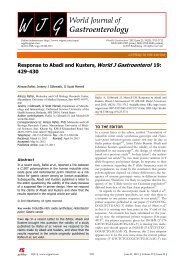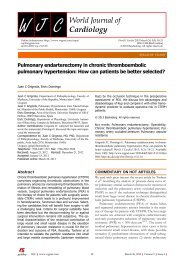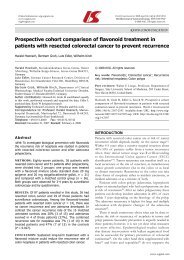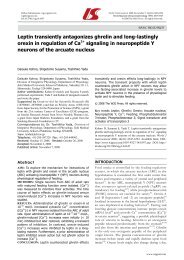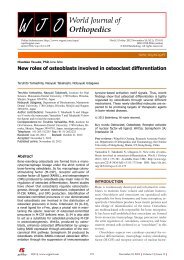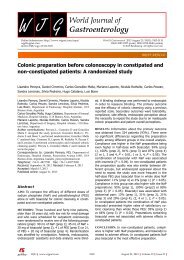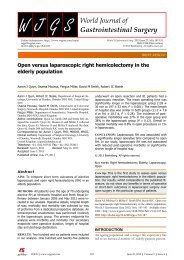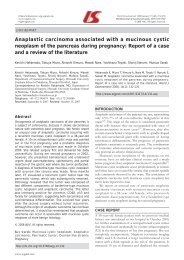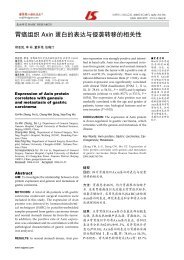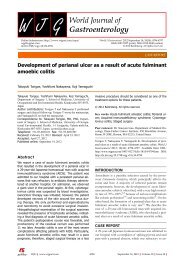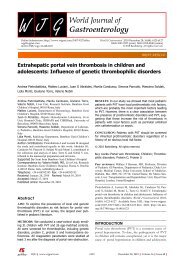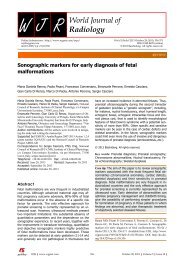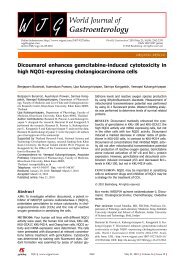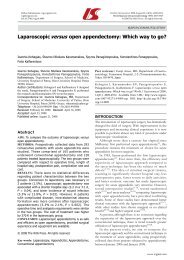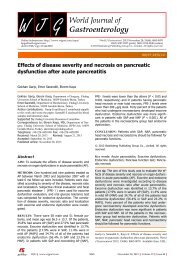World Journal of Gastrointestinal Pathophysiology
World Journal of Gastrointestinal Pathophysiology
World Journal of Gastrointestinal Pathophysiology
Create successful ePaper yourself
Turn your PDF publications into a flip-book with our unique Google optimized e-Paper software.
A<br />
B<br />
Sherman AE et al . Sonic Hedgehog and gastric cancer<br />
Shh<br />
Chronic inflammation<br />
IL-1β<br />
IFN-γ<br />
TNF-α<br />
Helicobacter<br />
↑IL-1β<br />
↑IFN-γ<br />
↑TNF-α<br />
↓Shh<br />
Altered MSC<br />
expression pr<strong>of</strong>ile<br />
MSC<br />
Metaplastic<br />
changes<br />
↑Cdx2<br />
↑Shh<br />
MSC<br />
liferating in the dysplastic glands <strong>of</strong> the stomach. Furthermore,<br />
this MSC engraftment could only be demonstrated<br />
with concurrent Helicobacter infection, supporting the idea<br />
that chronic inflammation is necessary for the development<br />
<strong>of</strong> parietal cell atrophy and subsequent neoplastic<br />
transformation. Furthermore, it has been shown that inhibition<br />
<strong>of</strong> Hedgehog signaling by cyclopamine decreases<br />
MSC cell proliferation and clonogenecity, suggesting a<br />
role <strong>of</strong> Hedgehog in the maintenance <strong>of</strong> this cell population<br />
in the periphery [50] . Emerging data provides further<br />
evidence for the role <strong>of</strong> MSCs in gastric carcinogenesis.<br />
MSCs have been isolated and characterized from patients<br />
WJGP|www.wjgnet.com<br />
MSC<br />
Th1<br />
Parietal<br />
cell<br />
atrophy<br />
MSC<br />
Figure 1 Neoplastic transformation <strong>of</strong> the stomach triggered by chronic<br />
inflammation. A: Helicobacter infection induces chronic inflammation mediated<br />
by Th1 cells leading to loss <strong>of</strong> Shh-secreting parietal cells; B: Inflammatory<br />
cytokines present in stomach influence expression <strong>of</strong> recruited MSCs, altering<br />
their expression pr<strong>of</strong>ile leading to metaplastic changes, the preliminary step in<br />
gastric carcinogenesis. IL-1β: Interleukin-1beta; IFN: Interferon; TNF: Tumor<br />
necrosis factor; Shh: Sonic hedgehog; Cdx2: Caudal type homeobox 2; MSCs:<br />
Mesenchymal stem cells.<br />
undergoing radical gastrectomy for stomach cancer [51,52] .<br />
These cells expressed CD44, had a larger population in S<br />
phase compared to control, but lacked tumorigenic properties<br />
when transplanted into BALB/c nude mice. Further<br />
studies are warranted on the impact <strong>of</strong> aberrant Shh<br />
expression on the differentiation <strong>of</strong> recruited MSCs and<br />
their role in gastric tumorigenesis.<br />
Persistent H. pylori infection remains one <strong>of</strong> the key<br />
events leading to gastric adenocarcinoma. The loss <strong>of</strong><br />
parietal cells and secretion <strong>of</strong> inflammatory cytokines,<br />
including IL-1β and IFN-γ secreted by Th1 cells induced<br />
by persistent Helicobacter infection, causes suppression <strong>of</strong><br />
Shh signaling (Figure 1A). When recruited MSCs repopulate<br />
the gastric epithelium, the presence <strong>of</strong> inflammatory<br />
cytokines in combination with the absence <strong>of</strong> adequate<br />
Shh expression allows for metaplastic changes, including<br />
increased expression <strong>of</strong> Cdx2, ultimately leading to dysplasia<br />
and subsequent cancer development (Figure 1B).<br />
The malignant transformation <strong>of</strong> MSCs into cancer-promoting<br />
cells may be induced by inflammatory cytokines<br />
secreted during chronic gastritis. Malignantly transformed<br />
MSCs may be the site <strong>of</strong> Shh secretion associated with<br />
gastric carcinomas. However, the in vivo malignant transformation<br />
<strong>of</strong> MSCs in response to chronic inflammation<br />
is not yet known.<br />
CONCLUSION<br />
Chronic inflammation is typically caused by H. pylori and<br />
is the most consistent lesion leading to gastric cancer.<br />
During the progression from inflammation to cancer, the<br />
stomach epithelium changes with evidence <strong>of</strong> the disruption<br />
<strong>of</strong> normal epithelial cell differentiation, infiltrating<br />
inflammatory cells and the recruitment <strong>of</strong> bone marrow<br />
derived MSCs. Coincident with changes in cell differentiation<br />
associated with the development <strong>of</strong> atrophic gastritis<br />
and metaplasia, is the loss <strong>of</strong> Shh. Given its predicted<br />
critical role as a regulator <strong>of</strong> gastric tissue homeostasis,<br />
the disruption <strong>of</strong> Shh expression during inflammation<br />
would be expected to result in loss <strong>of</strong> normal epithelial<br />
cell differentiation, but this has only recently been rigorously<br />
tested in vivo using the HKCre/Shh KO mouse model.<br />
Studies using HKCre/Shh KO mice reveal for the first time<br />
a direct role <strong>of</strong> Shh as a regulator <strong>of</strong> epithelial cell function<br />
and differentiation in the normal adult stomach. The<br />
dysregulation may be seen as a global increase or decrease<br />
in expression, or in altered location <strong>of</strong> expression. For example,<br />
atrophic gastritis and intestinal metaplasia are associated<br />
with the loss <strong>of</strong> Shh within the fundic mucosa [18,19] ,<br />
while elevated Shh and signaling is associated with gastric<br />
cancers [37,46,53] . Although the association between Shh and<br />
gastric cancer is clear, the mechanism that regulates the<br />
production <strong>of</strong> Shh protein within the tumor microenvironment<br />
and the precise role <strong>of</strong> Shh in tumor progression<br />
are still largely unknown. Understanding the role <strong>of</strong> Shh<br />
in the neoplastic transformations associated with chronic<br />
gastric inflammation would allow for the development <strong>of</strong><br />
targeted therapeutics and preventative strategies.<br />
106 December 15, 2011|Volume 2|Issue 6|



